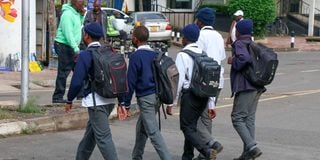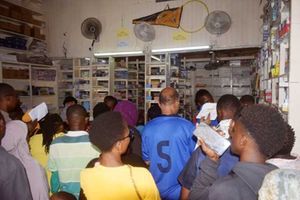
Students walk on the streets of Nakuru City on October 18, 2024 after schools closed for the December holidays.
Public schools heads will have to wait longer for funds after the National Treasury said it will release Sh48 billion in capitation later this month.
Schools reopened on Monday without the 50 per cent capitation due to them even as many of them grapple with lack of classrooms for Grade 9 learners.
On Tuesday, Treasury Cabinet Secretary John Mbadi said the government was mobilising resources and working closely with the Education ministry to ensure money hits the schools’ accounts before January 31.
“We are working closely with the Ministry of Education to ensure money is released to schools on time and ensure smooth learning,” Mr Mbadi told the Nation.
He said he was aware of the concerns raised by schools on the timely release of funds but urged them to bear with the government for a short time.
He explained that January and February are normally very tricky months for the government financially, but maintained that the capitation to schools is among payments that the Treasury has prioritised.
“Our priority this year is to pay back the loans, release capitation to schools, pay salaries and release the December allocation to county governments,” Mr Mbadi said.
“Let schools not act like there is an emergency, learning can still go on even if we have not released the funds. I can, however, assure them salaries of all school workers is available.”
The CS pointed out that in the event the government fails to get the Sh48 billion in one tranche, at least half of the amount would be released to schools.
Education CS Julius Ogamba, in a statement released last week, assured schools that the ministry is collaborating with Treasury to ensure the Sh48.38 billion is released.
The amount includes Sh4.12 billion for free primary education, Sh15.32 billion for free day junior school education while free day secondary school education will receive Sh28.92 billion.
This comes amid calls by MPs to increase the capitation for learners in both primary and day secondary schools. The Education ministry is expected to respond to queries by Suna West MP Peter Masara on the decreasing capitation to schools.
“The current government capitation to both primary and secondary schools is not sufficient to address the current rising cost of living and inflation. This financial strain leaves schools struggling to provide essential resources, hence compromising the quality of education,” Mr Masara said.
He told the government that while it strives to provide free education, it should ensure that quality is not compromised by providing adequate resources to sustain learning activities.
The Presidential Working Party on Education Reform had proposed an increase in capitation for primary school learners from Sh1,420 to Sh2,238, junior school Sh15, 043 and secondary schools Sh22,527 from Sh22, 244.
The government is yet to implement these proposals.









